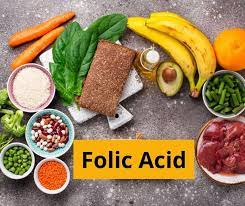Welcome to Health, Life and Art solutions
Folic Acid in Pregnancy and Anemia
learn why folic acid is important for pregnant lady
Dr. Faiza A.R Khamissa
5/1/20244 min read


Learn what is folic acid? and Role of folic acid in pregnancy and anemia.
Introduction
Folic acid, a B9 vitamin, plays a pivotal role in supporting maternal and fetal health during pregnancy. Beyond its significance in pregnancy, it also aids in preventing anemia and Red cells maturation. Discover the importance, benefits, sources, and supplementation guidelines for folic acid. Get insights into managing anemia and supporting a healthy pregnancy.
What is Folic Acid?
Folic acid, also known as folate or vitamin B9, is a water-soluble vitamin essential for various bodily functions, particularly during periods of rapid cell division, growth and maturation, such as during pregnancy. It has crucial role for the synthesis of DNA, RNA, and red blood cells, making it very important for fetal development and maternal health.
Importance of Folic Acid in Pregnancy
Folic acid plays a crucial role in pregnancy by supporting fetal development and reducing the risk of birth defects, particularly neural tube defects (NTDs) like spina bifida and anencephaly. Adequate folic acid intake before conception and during early pregnancy significantly lowers the chances of NTDs, underscoring its importance for maternal and child health.
During pregnancy, folic acid helps in the formation of the neural tube, which later develops into the baby's brain and spinal cord. It also contributes to the production and maturation of red blood cells and supports the placental growth and function, ensuring proper nutrient and oxygen delivery to the developing fetus.
Folic Acid and Anemia
Anemia is characterized by a deficiency of red blood cells or hemoglobin in the blood, is a common condition during pregnancy specially in low – income countries.
Folic acid plays a crucial role in preventing and treating anemia by supporting red blood cell production, maturation and improving hemoglobin levels. Its deficiency can lead to megaloblastic anemia, a type of anemia, characterized by abnormally large red blood cells that are unable to function effectively.
Ensuring an adequate intake of folic acid through diet or over the counter supplementation can help prevent anemia and its associated complications, such as fatigue, weakness, and increased susceptibility to infections.
Sources of Folic Acid
Folic acid is found naturally in various foods, including leafy greens e.g. spinach and kale, legumes, citrus fruits, fortified grains, and liver. However, it can also be obtained through dietary supplements, especially for individuals who may have difficulty meeting their daily requirements through food alone.
Folic Acid Supplementation Guidelines
Pregnant individuals are advised to take a daily folic acid supplement of 400 to 800 micrograms (mcg) to meet their increased nutritional needs during pregnancy. It is recommended to start supplementation ideally before conception and continue throughout the first trimester to reduce the risk of neural tube defects.
Consulting healthcare professionals for personalized guidance on folic acid supplementation is crucial, as individual requirements may vary based on factors such as pre-existing medical conditions for e.g. previous history of NTDS, obesity or Diabetes, which daily requirement increases and recommended dose is 5mg per day.
Folic Acid Deficiency
Inadequate intake of folic acid can lead to a folate deficiency anemia, resulting in various sign and symptoms, including fatigue, weakness, and increased susceptibility to infections. Pregnant individuals with folic acid deficiency are at higher risk of complications, such as preterm birth, low birth weight, and developmental abnormalities e.g. NTDs in the fetus.
Recognizing the symptoms of folic acid deficiency, such as fatigue, shortness of breath, and poor concentration, is essential for prompt intervention and management.
Folic Acid in Anemia Treatment
Folic acid supplementation is often included as part of the treatment regimen for anemia, especially when the underlying cause is related to insufficient folate levels. It works by supporting red blood cell production, maturation and improving hemoglobin synthesis, thereby aiding in the management of anemia and promoting overall improvement in symptoms.
In conjunction with other interventions, such as dietary modifications and iron supplementation, folic acid plays a crucial role in restoring normal blood cell counts and alleviating symptoms of anemia.
Benefits of Folic Acid beyond Pregnancy
While folic acid's significance is widely recognized in pregnancy, its benefits extend beyond gestation. Adequate intake of folic acid is associated with a reduced risk of cardiovascular diseases, certain cancers, and cognitive decline later in life. Incorporating folic acid-rich foods into the diet or taking supplements can contribute to long-term health and well-being.
Folic Acid and FAQs (Frequently Asked Questions)
Q: What is the recommended daily intake of folic acid?
A: For most adults, including pregnant women, the recommended dosage is 400 micrograms per day. However, pregnant women may require higher doses such as 5 mg per day in certain conditions to support fetal development.
Q: Can folic acid supplements prevent birth defects?
A: Yes, adequate folic acid intake before and during pregnancy has been shown to significantly reduce the risk of neural tube defects in newborns.
Q: Are there any side effects of taking folic acid?
A: While rare, some individuals may experience side effects such as nausea, bloating, gas, and insomnia when taking folic acid supplements.
Q: Should folic acid supplementation be continued after pregnancy?
A: While the need for supplementation decreases after childbirth, it is still recommended for breastfeeding mothers to ensure adequate nutrient levels. Additionally, women planning future pregnancies should continue taking folic acid, at least 3 months prior to conception, to support overall health.
Q: Are there any interactions between folic acid and other medications?
A: Yes, certain medications can interfere with folic acid absorption or increase the body's need for this nutrient. It's essential to consult a healthcare provider about the appropriate dosage when taking such medications.
Conclusion: Embracing the Benefits of Folic Acid
In conclusion, folic acid has as a powerful role in promoting health and preventing birth defects and anemia. From supporting cell growth, development and maturation to reducing the risk of neural tube defects, its importance cannot be overstated. By ensuring adequate intake i.e. 400 micrograms per day through a balanced diet and supplementation when necessary, we can harness the full potential of this essential nutrient for ourselves and future generations.


